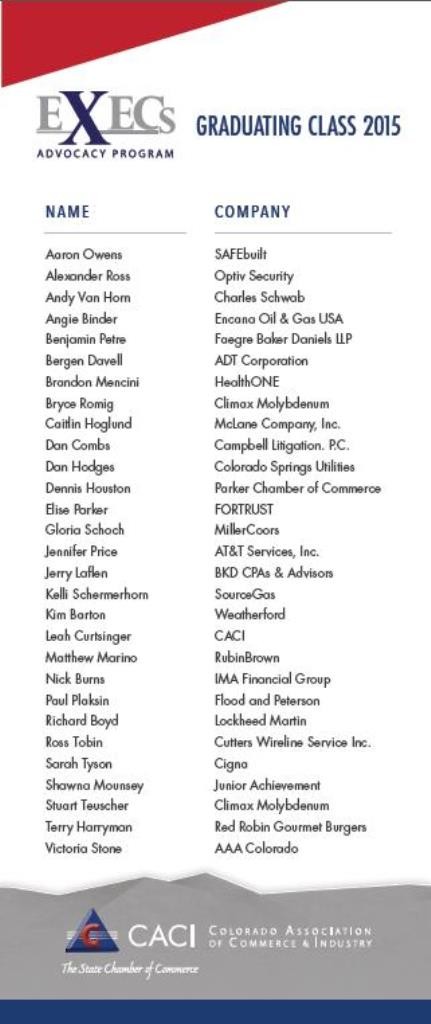In this Capitol Report:
This Capitol Report is brought to you by:
State Policy News
CDLE Issues Clarification on Vacation Pay Policy but Questions Remain
This week, the Colorado Department of Labor & Employment issued guidance to employers on it’s position of “use it or lose it” vacation policies used by employers in Colorado for many years. The guidance can be found at the following link: https://www.colorado.gov/pacific/cdle/node/20161.
Background: In recent weeks, the Department communicated information publicly that it potentially planned to prohibit the use of “use it or lose it” vacation policies by employers based on interpretation of recent changes to the Colorado Wage Law which was amended in 2014. The guidance issued by the Department is an attempt to clarify it’s position which continues to support employers’ establishment of a “use it or lose it” policy, however, there are questions outstanding as to how the Department believes “earned” vacation time should be treated.
Chris Ottele, a labor and employment attorney with the Law Firm of Husch Blackwell, has written an excellent summary of this issue which he has shared with CACI. This summary outlines why employers should consider certain options when establishing vacation policies and we believe it is important to share this information with our CACI members.
Legal Alert by Chris Ottele, attorney for the
Law Firm of Husch Blackwell:The Colorado Division of Labor (the Division) recently issued its much anticipated guidance on “use it or lose it” vacation policies. As we wrote last month in a legal alert, the Division had considered prohibiting “use it or lose it” policies that require employees to use vacation time on an annual or other basis. In response to legal and media attention, the Division has attempted to clarify its position; however, questions remain.
The Division’s Guidance
In a new Frequently Asked Questions posting on its website, the Division declared that a “use it or lose it” policy is permissible so long as “such policy is included in the terms of an agreement between the employer and employee.” As most employers already knew, employers must pay out vacation pay that is earned and determinable upon separation. The Division’s focus, and thus the crucial issue for employers, is when vacation time is considered “earned.” The Division will first look to the terms of the vacation policy. If the policy is silent, then the Division will look to the employer’s historical practices, industry norms, subjective understandings of the employer and employee, and other case-specific factors.
The Division’s guidance, while generally favorable for employers, still leaves some open questions. In particular, the Division cautioned employers that a vacation policy may not “operate to deprive an employee of earned vacation time and/or the wages associated with that time.” The Division did not give examples of or additional guidance on what would constitute a prohibited policy. Under one interpretation, the Division is merely counseling employers that they may not implement a vacation policy that results in forfeiture of vacation time earned under a previous policy or agreement. But under a more expansive interpretation, the Division may be asserting that when a policy provides that vacation is “earned,” it cannot later be lost as a result of a carryover limit or other use requirement, even if those requirements are spelled out in the policy.
The Division did not address whether paid time off (PTO) policies, which combine sick leave and vacation leave into one leave bank, are subject to the same requirements as stand-alone vacation policies. The Division’s guidance and the Colorado Wage Act refer only to “vacation,” so arguably the prohibition does not apply to PTO. The Division also did not address how it views a vacation policy within an employee handbook containing an explicit disclaimer that it is not a contract. In such cases, there may be a question of what is the “agreement” between the employer and the employee.
What This Means to You
Although the Division’s guidance does not have the legal effect of a statute or regulation, it does describe its enforcement priorities under the Wage Protection Act that took effect January 1, 2015.
Employers have options to consider with respect to their vacation policies:
For employers that seek to maintain use requirements or carryover limits, consider declaring that vacation is not “earned,” but rather made available for use like sick leave. Or consider providing that vacation time is only “earned” once it is used.
Set an accrual cap that limits the total number of vacation hours an employee may earn.
Consider removing vacation policies from a handbook, guidelines or other policies that disclaim the existence of a contract. Instead, describe the terms of vacation accrual and use in a separate agreement as you do for confidentiality and noncompetition agreements.
Until the courts provide clarity on these issues, employers should be aware that employees (and their attorneys) may challenge their vacation pay-out policies, particularly the applicability of these rules to common practices such as PTO banks and annual carryover limits. Vacation policies vary according to each employer’s business needs. To assess the likelihood that a particular policy will withstand scrutiny requires an individualized assessment of the policy’s terms in light of the Colorado Wage Act and the Division’s guidance.
For more information on these options, contact one of Husch Blackwell’s Labor & Employment attorneys in Colorado
Additionally, a quick glance at the Department FAQ’s is provided below for your review:
Q. Can employers in Colorado have “use it or lose it” provisions in vacation agreements.
A. Yes. “Use-it-or-lose-it” policies are permissible under the Colorado Wage Protection Act, provided that any such policy is included in the terms of an agreement between the employer and employee. A “use-it-or-lose-it” policy may not operate to deprive an employee of earned vacation time and/or the wages associated with that time. Any vacation pay that is “earned and determinable” must be paid upon separation of employment. The terms of an agreement between the employer and employee will dictate when vacation pay is “earned.”
Q. What factors are used to determine if a specific “use it or lose it” provision is permissible?
A. If a party challenges the validity of a “use-it-or-lose-it” policy, the Division will initiate a wage complaint investigation, The Division will review the policy in conjunction with the remaining terms of the agreement between the employer and employee. In the event that an agreement is silent or ambiguous as to when vacation becomes “earned,” the Division may consider the following factors in determining whether a “use-it-or-lose-it” provision is permissible under the CWA.
- The employer’s historical practices
- Industry norms and standards
- The subjective understandings of the employer and employee.
- And any other factual considerations which may shed light on when vacation time becomes “earned” under the agreement in question.
These factors are not exhaustive and may vary from case to case.
Please contact Loren Furman at [email protected] or at 303-866-9642 if you should have questions/concerns regarding this issue.
Graduation Time: Second CACI EXECS Advocacy Program Class Receives “Diplomas”
The CACI EXECs Advocacy Program wrapped up its second year with a one-of-a kind graduation event at CACI Mission Trustee MillerCoors on October 7th in Golden.
Guest speakers included Phil Savastano, CACI Board Member and Vice President of MillerCoors’ Golden Valley Operations, and Warren Quilliam, Director of Brewing and Malting at MillerCoors.
Leland Lorentzen, CACI’s 2014-2015 Board Chair, and Owner, Golden Aluminum, addressed the graduating class and thanked them for their dedication to helping sustain a pro-business Colorado.
Following the ceremony, the graduating class and guests were given a behind-the-scenes tour of MillerCoors that is not available to the public. The reception was held at Bill’s Bar, an employee-only bar located on the MillerCoors campus.
Below is the list of the graduating class:
Congratulations, Class of 2015!
CACI members interested in applying to participate in the 2015-2016 EXECs Advocacy Program should contact Lalitha Christian, EXECs Program Manager at 303.866.9635 for details.






